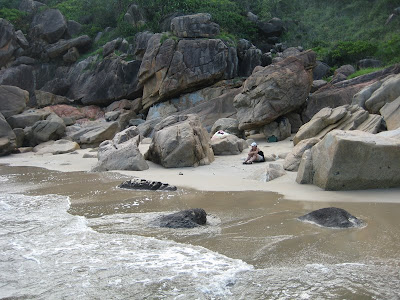
So the school year has officially begun for freshmen, which means that I (Steven) have actually started teaching. It's been a kick so far (though a bit exhausting, to tell the truth).
I teach three different classes that each meet twice a week for an hour and a half. One of my two speaking-focused classes is a group of English majors who are also teachers-in-training. The students in this class were required to have the highest English exam scores of everyone, thus they tend to be the most proficient (the word 'proficient' is used rather loosely in this case.) I have another class of 'general studies' English majors, who are studying English and nothing else. I teach them the same speaking lessons as the teachers-in-training, but their overall English level is a little lower. Finally, I teach a mix of reading, writing, speaking and listening to one class of students majoring in Vietnamese Studies. These are students who never chose to study English in the first place, but are required to take two semesters' worth for their major. The majority of these students would be classified as beginners--low, low, low level.

Part of the difficulty that all of my students have with understanding English is due to the fact that they all most likely studied grammar (and little else) in their high school English classes. While they might be able to read a sentence and tell me whether it's in the simple past or the past perfect tense, some of them don't understand when I ask them even simple questions like "What is your name?"
It's kind of a fun challenge teaching students who are starting from very little or no knowledge of the (spoken) language whatsoever. You can ask me in a few months how much progress has been made...
In other news, we were invited to go to a picnic this weekend with one of Jason's classes from last semester. We ended up at a beach a few miles out of town and got to participate in some fun picnic games, which included dividing into two teams and seeing which one could start a fire and cook the meat for lunch the quickest. (Our team won. Though anyone concerned about food safety might question the wisdom of seeing who can cook any meat product 'the fastest.')

Joelle and I also experienced a Vietnamese first: Being asked by a class to sing them a song. We were warned that this is inevitable, and sure enough after the sandwiches were finished, the requests started coming. The four of us foreigners managed to croak our way through a couple different songs, both of which were met with somewhat confused looks and delayed applause from the students. (If we'd really wanted to bring down the house we would have had to have busted out Celine Dion's My Heart Will Go On and we simply weren't prepared to do that.)
Though Joelle and I didn't really know any of the students, we were warmly welcomed and had a great time with them all. You can check out our whole photo album of the picnic here.













